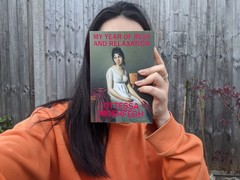We're discussing a new chapter each week. Read along with us and submit your thoughts to coronabookclub@vice.com.
At the beginning of this chapter, the narrator talks about the art world, noting “I might as well have worked on Wall Street,” though art itself is a “sacred human ritual.” We know that she prizes art above basically everything else – what does the way she speaks about it here tell us?
Leri Riglar (via email): Before starting work at Ducat, it seems that the narrator had an idealistic view of the art world. Despite studying art history, she overlooked the fact that art has always been bought and sold, largely by people with significant disposable income. It probably shouldn’t be so surprising then, that in the New York portrayed in the novel, this culminates in people dealing in art for reasons other than simple appreciation of this “sacred human ritual.” The comparison to Wall Street is very apt because the narrator is wrestling with the difference between intrinsic value and market value, and also emphasises the amoral nature of some of the art in Ducat, such as Ping Xi’s poor frozen dogs.Hannah Ewens: Art being a “sacred human ritual” makes me believe that she thinks of her year-long sleep practice as an experiential art piece. Materials: the body, the mind; method: transcending reality. If Ping Xi and other rich art brats can get away with their gross animal art then this rich art brat with a keen eye for truth in art can certainly at least hope for something real in her project. There’s something spiritual to me about what she’s doing.Lauren O’Neill: The way she speaks about art is extremely telling. When would this narrator ever call anything else “sacred”? It’s extremely out of character, and it tells us that there is at least one thing about the world that she holds dear. She has spoken about art in previous chapters: we know that she wanted to be an artist herself, and in the chapter where she goes to Reva’s mother’s funeral, when Reva shows her her mother’s paintings, she notes that “They’re decent amateur watercolours.” Even if she is being snarky here, we do have to ask, when has she voiced this much analysis about any other piece of stimulus? It seems to me that art and her love of it could be the thing that pulls her through her situation, in some way or another.We learn that the narrator has been partying during her Infermiterol sleep. Why do you think that is?
HE: Her aim of wiping out days with inactivity is clearly not working anymore. Whether she’s physiologically getting used to the medications or something deeper, like her psyche and soul are resisting her burying pain any longer, her experiment is failing. Her soul wants to purge, deep down the narrator wants to live! Related to her “sacred human ritual” and this blackout activity: humans used to get up during the night before electricity. It was commonplace to have your sleep split into two: rest – then a period of chores, fucking or even visiting friends – and rest again. Before the industrial revolution and capitalism, what she’s doing was normal.During lockdown, I’ve been doing something similar (note: blessed with being able to wfh and don’t have kids, etc) because my body is craving activity and connection. This narrator needs knackering out through real life experience. That’s how she’ll “get better.”LO: Going out to clubs isn’t something that the narrator ever really did in her waking life. “I’d always preferred a septic hotel bar, maybe because that’s where Trevor liked to take me,” she says. I like the idea of the Infermiterol coaxing out another side to her – like the id to a superego that just wants to sleep – which enjoys losing control a bit. A sort of Dr. Jekyll / Mr. Hyde thing, but for taking pingers at Tunnel.The narrator remembers an incident from college, when a professor made the other students analyse her as if she were an art piece. What do you think of the narrator’s response to this?
LO: She responds by withdrawing from the class – on “Feminist Theories and Art Practices 1960 –1990” – and taking a class on Neoclassical painting instead. During the confrontation with her class, she is asked how much she paid for her shoes ($500), and another student says she has been “broken by the male gaze.” The narrator notes that they were “one of many purchases I’d made to mitigate the pain of having lost my parents, or whatever it was I was feeling.” You could see this as an eye-rolling rejection of the type of self-satisfied intellectualism people might flaunt as undergraduates, or a refusal to self-examine in terms of her own habits (her desire to sleep might relate there) – it’s probably a bit of both.Leri: The way the college professor behaved was bang out of order. Although the narrator talks witheringly of the student who refers to the “male gaze,” her acquiescence to being analysed in this way suggests that she has internalised the view of herself as something of an object (as implied by her preoccupation with beauty.)
HE: I felt the spite and envy of the teacher – she seemed to believe that being hot and thin and white and thin meant the narrator could never go through pain. A “what could stop someone like YOU from turning up on time and being top of the class??” sort of sentiment. I don’t think we’re supposed to pity the narrator for being attractive or disregard her immense privileges, by the way. But I do think it affected the narrator, being looked at and mocked hurt her. The students were happy to follow the professor’s lead and attack her which must’ve emphasised how being vulnerable and hurting publicly in the world – she’s clearly distressed, orphaned and coming in with a broken shoe – never garnered any connection or even sympathy.In this chapter, the narrator begins calling Trevor. Why is she reaching out to him at this moment?
HE: This was just so bleak. Is she not over this guy yet? He’s been off the scene for ages. But anyway: she’s calling him because her other coping mechanism – sleeping – isn’t working so now she’s self-harming, in her own way. She knows the temptation, the pain, the self-loathing that Trevor inspires in her.Leri: The narrator starts trying to speak to Trevor again when she is unable to fall asleep, suggesting that she knows she needs to get closure. She intensifies her efforts after Reva tells her about the break-up with Ken. I think the narrator wants to undermine this apparent parallel between their lives: she encourages Reva to take a more aggressive approach with Ken but Reva refuses. By hounding Trevor in this way, the narrator is showing a different power dynamic in their relationship.More simply though, the description of Trevor leaving “like a buoy on an empty sea” reminds us that the narrator is profoundly lonely.We find out that Reva will be moving offices in this chapter. What effect does this news have?
LO: This reaffirms the narrator’s reasoning for behaving the way she does. Everyone she loves leaves her, and soon Reva will too, regardless of whether she manages to sleep for a year or not. The narrator believes that her year of rest will allow her to come out of the other side of her grief healed and new, but what she will learn is that actually, life simply goes on, and there will be new pain. For most of us, however, the pain of our lives is also balanced by moments of joy and connection, but the narrator is not allowing herself to experience those, and so all she feels is the suffering. Perhaps if she loses a person who really does love her, she will understand that.Leri: Any reference to the Twin Towers links unavoidably to 9/11 in the reader’s mind, so this revelation strengthens the feeling of dread that gradually grows through the book. The tragic irony is really dialled up to eleven, as it seems Reva is going to be working for a firm assessing terrorist risks, and talks about how peaceful it is at the Twin Towers. Once she has finished venting about Ken, she seems to be quite optimistic about the future, an optimism that the reader knows is brutally misplaced.HE: Like I said last week, I didn’t realise that this was to some degree a 9/11 novel, so this reveal about Reva moving into the World Trade Centre was stomach-dropping. In a literary sense, it was an amazing and horrifying “pay off”. I think this would’ve been a 10/10 novel for me anyway, without this extra layer that seems to be unfolding.I was heartbroken to imagine the narrator losing the only connection to the real world she has, the only real relationship she has – if we might call it that – and simultaneously moved knowing that the narrator will have no choice but to deal with her problems without Reva. I mean, Reva is… going to die, isn’t she?I feel sad that despite her own psychological problems Reva never got the chance to blossom. Unlike the narrator, she always remained hopeful and a person of the world, despite being stuck in very negative patterns. Reva isn’t even in her thirties yet; she was going to be OK.PROMPTS FOR WEEK SIX
a) The narrator’s financial advisor tells her to sell her parents’ house in this chapter. How does this make her feel?
b) Some flowers arrive at the narrator’s apartment building and for a split second, she believes they are from Trevor. “Was this the beginning of a new life?” she asks. Do you think this would be the life she wants?
c) The narrator watches George W. Bush’s 2001 inauguration on TV, and later it’s noted that, “the Senate has confirmed Mitch Daniels as director of the White House Office of Management and Budget for the newly minted Bush administration. Fifty-one-year-old Daniels has been a senior vice president for Eli Lilly and Company, the Indianapolis-based pharmaceutical giant.” Why does Moshfegh include this detail in this chapter?
d) How does the tone change when the narrator realises she’s without her pills?
e) We finally get inside Reva’s apartment in this chapter. What is it like? How does it make you feel? How does it relate to the idea the narrator has given us of Reva?
@hiyalauren / @hannahrosewens

